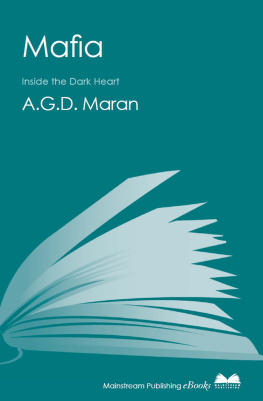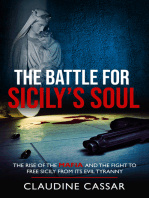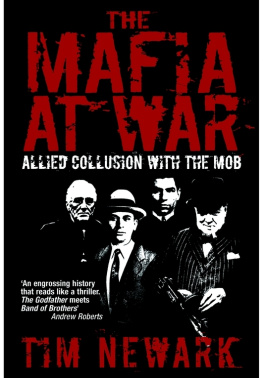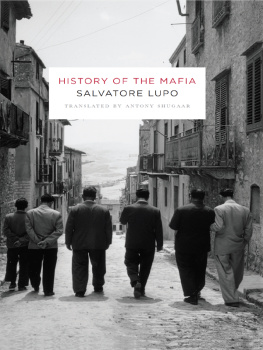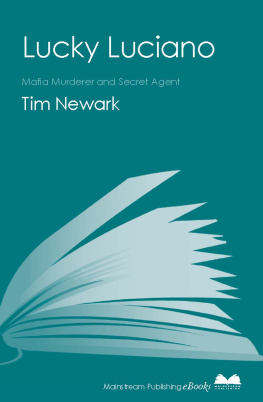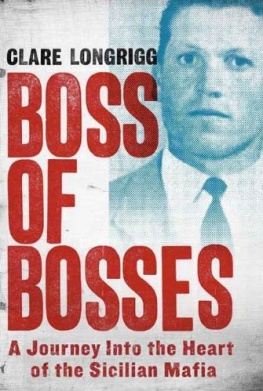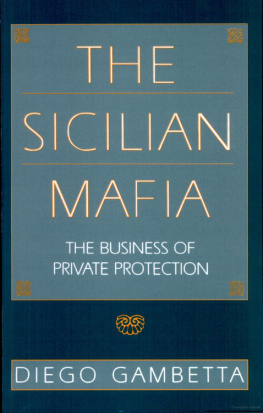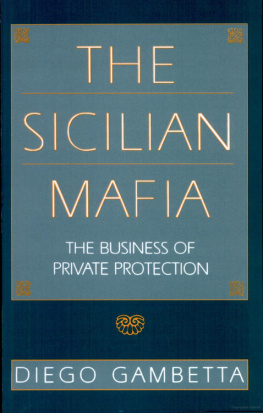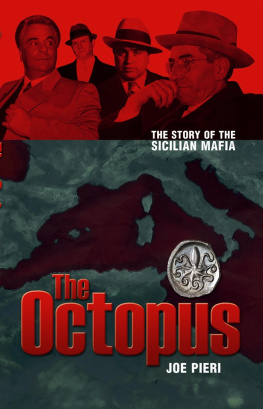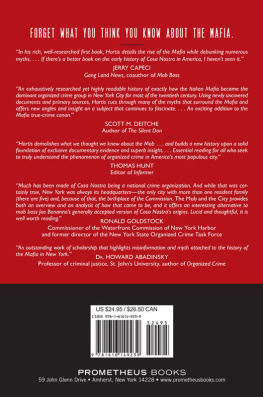A BOUT THE A UTHOR
A.G.D. Maran was an internationally renowned head and neck cancer surgeon who retired in 2000 in order to spend more time in Italy. He served as President of the Royal College of Surgeons, and during his professional career wrote and edited six books on various aspects of surgery and published over 150 papers in scientific journals. He wrote about his experiences with classical and pop singers in The Voice Doctor and is at present working on a new book on Italian-American crime.
He has lived in Italy for part of each year for over 50 years and so has had a grandstand view of the changes that have affected Italy so cruelly. It was a recently uncovered family secret that led to his interest in the Mafia and this book represents five years of research. He now divides his time between Italy and Edinburgh.
MAFIA
Inside the Dark Heart
A.G.D. Maran
This eBook is copyright material and must not be copied, reproduced, transferred, distributed, leased, licenced or publicly performed or used in any way except as specifically permitted in writing by the publishers, as allowed under the terms and conditions under which it was purchased or as strictly permitted by applicable copyright law. Any unauthorised distribution or use of this text may be a direct infringement of the authors and publishers rights and those responsible may be liable in law accordingly.
Epub ISBN: 9781780572369
Version 1.0
www.mainstreampublishing.com
This edition, 2009
Copyright A.G.D. Maran, 2008
All rights reserved
The moral right of the author has been asserted
First published in Great Britain in 2008 by
MAINSTREAM PUBLISHING COMPANY
(EDINBURGH) LTD
7 Albany Street
Edinburgh EH1 3UG
ISBN 9781845964573
No part of this book may be reproduced or transmitted
in any form or by any other means without permission
in writing from the publisher, except by a reviewer
who wishes to quote brief passages in connection
with a review written for insertion in
a magazine, newspaper or broadcast
A catalogue record for this book is available
from the British Library
The Mafia is a human phenomenon. And like all human phenomena, it has a beginning, a zenith and it has an end.
Giovanni Falcone, the magistrate
who started the break-up of the Mafia
A CKNOWLEDGEMENTS
Many people have tried to help me understand the Mafia and much of my learning has been by osmosis over cups of coffee in various piazzas. Writing about secret societies presents certain obvious difficulties because the primary sources are secret and the nearest one can get to finding out the truth comes from court proceedings, confessions or police statements, but even then, in the convoluted environment that is Italian politics, perhaps not even these documents illustrate the truth.
I owe a great debt to the friends who have been willing to share their opinions with me, especially those whose position in politics made it potentially damaging for them to talk freely. The people I was introduced to in Sicily by my medical colleagues seemed to know more than the average citizen, and while I could thank them publicly they would not thank me for doing so.
I am grateful for the help I received from the Miraglia family. Accursio Miraglia was one of the eight elected Communist mayors murdered by the Mafia in January 1947.
I was particularly fortunate in having a relative who was a high-ranking official in the Communist Party for over 30 years. I must mention and thank Professor Carlo Corradini, who first gave me the concept of the differing character the Mafia has taken.
The Italian language comes in various sizes colloquial, dialect, proper and legalese. I can do proper, but when I needed help with the other varieties I was aided by Anna and Maurizio Meoni, Paola Antonini and Elio Marcantonio.
I am grateful to the Grand Lodge of Scotland, which introduced me to the Masonic historian Yasha Beresiner, who has been Master of Lodges both in Israel and Italy, and his research helped me greatly in the chapter on the infamous P2 Lodge.
Writers need help from libraries and librarians, and I must single out Marianne Smith, Librarian of the Royal College of Surgeons of Edinburgh, both as a source of help and a shoulder to cry on. Chris Flexen of the colleges publications department did the maps during a period when he was moving house and he knows how much I appreciated that. I am also grateful to Ian Milne, librarian of the Royal College of Physicians of Edinburgh, for helping with some research.
Coming from the world of surgery rather than letters, I do not have rafts of literary friends who are able to give constructive criticism, but I must thank John Loudon and Stewart Russell for reading early drafts, and Stan Robertson for educating me in some aspects of banking and money laundering.
I had great help on the subject of psychopathy from the forensic psychologist Dr Keith Ashcroft, and for the conditions surrounding the death of the Pope John Paul I, I must thank the forensic pathologist, Professor Tony Busuttil. I was also helped in cardiac matters by Professor Sandy Muir, once the Queens physician in Scotland.
My editor Deborah Warner has painstakingly gone through the manuscript and filled cyberspace with hundreds of emails concerning queries and corrections. No one could have done more and, had I been her, I would have broken off midway in order to arrange a hit on me.
What remains incorrect is entirely mea culpa.
Thank you all.
P REFACE
F or any family in Great Britain, 1941 was not a good year, but for mine it was an annus horribilis. The Second World War was in its infancy, but my father had already been called up to serve in the British Army and so my mother, like many others her age, had to go out to work. But she went with problems that did not affect her peer group, namely the ever-present risk of arrest and imprisonment. My mother was Italian and so when Mussolini entered the war on the side of Germany in June 1940, Italians like her were among those listed for internment or jail if suspected of spying.
A few years earlier, my mother had brought her mother, brother and sister across to Scotland so that they could live near us a typical Italian arrangement. Unfortunately, her sister, who is now 102 and lives in Rome, had a boyfriend who was an Italian fighter pilot and so she and her brother were imprisoned for a year, suspected of being spies. My aunt was later released, but my uncle was interned. We had also lost a number of relatives when the commandeered liner the Arandora Star, carrying internees to camps in Canada, was sunk.
Thus I spent a lot of time with my nonna, my Italian grandmother. She was small, probably no more than five foot, and at that time she would have been in her late 50s. Everyone is nostalgic about grandmothers, and the universal memory is that grandmas were

